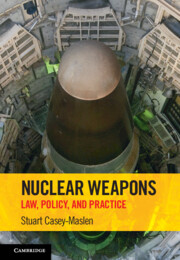Book contents
- Nuclear Weapons
- Nuclear Weapons
- Copyright page
- Contents
- Cases and Materials
- Table of Cases
- Introduction
- 1 The Development of Nuclear Weapons
- 2 Use of Nuclear Weapons
- 3 The Treaty on the Non-proliferation of Nuclear Weapons
- 4 The Testing of Nuclear Weapons
- 5 Agreements between Russia and the United States
- 6 Treaties Prohibiting Nuclear Weapons
- 7 Verification
- 8 Use and Testing of Nuclear Weapons under International Law
- Concluding Remarks on the Future of Nuclear Arms Control and Disarmament
- Select Bibliography
- Index
Introduction
Published online by Cambridge University Press: 14 October 2021
- Nuclear Weapons
- Nuclear Weapons
- Copyright page
- Contents
- Cases and Materials
- Table of Cases
- Introduction
- 1 The Development of Nuclear Weapons
- 2 Use of Nuclear Weapons
- 3 The Treaty on the Non-proliferation of Nuclear Weapons
- 4 The Testing of Nuclear Weapons
- 5 Agreements between Russia and the United States
- 6 Treaties Prohibiting Nuclear Weapons
- 7 Verification
- 8 Use and Testing of Nuclear Weapons under International Law
- Concluding Remarks on the Future of Nuclear Arms Control and Disarmament
- Select Bibliography
- Index
Summary
For the first time in a quarter of a century working with the problems of the arms race and arms control, I am beginning to get scared. These are not my words, but those of William Epstein, a disarmament expert, which he penned forty-five years ago.1 Epstein’s concern arose from an array of adverse circumstances. India had detonated a nuclear explosive device in 1974, becoming what he (wrongly) believed was only the world’s sixth nuclear-armed State (in fact, Israel had already produced nuclear weapons). Also in 1974, Britain had resumed explosive nuclear testing for the first time in a decade; the United States was increasing the sophistication of its manoeuvrable re-entry vehicles on its missiles in order to deliver multiple warheads while also engaging in the development of new nuclear-armed cruise missiles; and the Soviet Union was producing multiple independently targetable re-entry vehicles (MIRVs) of its own to equip its intercontinental ballistic missiles (ICBMs).
- Type
- Chapter
- Information
- Nuclear WeaponsLaw, Policy, and Practice, pp. 1 - 6Publisher: Cambridge University PressPrint publication year: 2021

